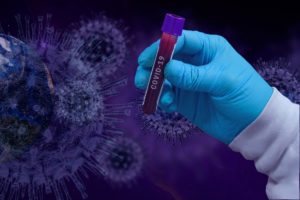
SHARE THIS ARTICLE:
Lyme Disease May Increase Risk of Severe COVID-19
News Medical covered a study that was recently published in the preprint server Research Square in which researchers report that those who have had a Borrelia burgdorferi infection are at greater risk for severe COVID-19/SARS-CoV-2.*
server Research Square in which researchers report that those who have had a Borrelia burgdorferi infection are at greater risk for severe COVID-19/SARS-CoV-2.*
A Microblot-Array for Borrelia species was used to analyze three patient groups: severe COVID-19 (hospitalized); mild or asymptomatic COVID-19 (treated at home or unaware of infection); and not infected with SARS-CoV-2.
Results indicate that heightened levels of Borrelia-specific IgG antibodies correlated strongly with severe cases of COVID-19, including need to be hospitalized. Testing showed that all 31 patients that were hospitalized because of COVID-19 were also positive for Borrelia burgdorferi-specific IgG. Of 28 patients with asymptomatic or mild COVID-19, 19 were found to be positive with Bb IgG. Of those never infected and in the participant group that had never been infected with SARS-CoV-2, only 8 positive Bb cases were found out of a total of 28.
Additionally, 6 out of 19 Borrelia antigens (VlsE B. garinii, p41 B. burgdorferi sensu stricto, OspB, OspA B. burgdorferi sensu stricto, OspC B. garinii, and OspC B. burgdorferi sensu stricto) were tested showing that patients with severe COVID-19 had considerably higher serum levels for these specific IgG than any other patient group. Of an additional 10 Borrelia antigens (VlsE B. afzelii, VlsE B. burgdorferi sensu stricto, p58, p41 B. afzelii, p39, OspA B. garinii, OspC B. afzelii, OspC B. spielmanii, Nap A and p17), patients with severe COVID-19 also showed much higher IgG serum levels than the participants with no SARS-CoV-2 infection. These findings demonstrate that previous exposure to Borrelia predisposes patients with SARS-CoV-2 infections to be more susceptible of severe disease outcomes.
Specific mechanisms of this association are not yet understood. The researchers suggest that screening for Borrelia burgdorferi antibodies could aid in better assessing the probability of severe infection in SARS-CoV-2 patients.
*Note this is a preprint and is in the process of being peer-reviewed.
Read the full article in Research Square.
Read coverage of the study on News Medical.
Read more about COVID and Lyme disease.





